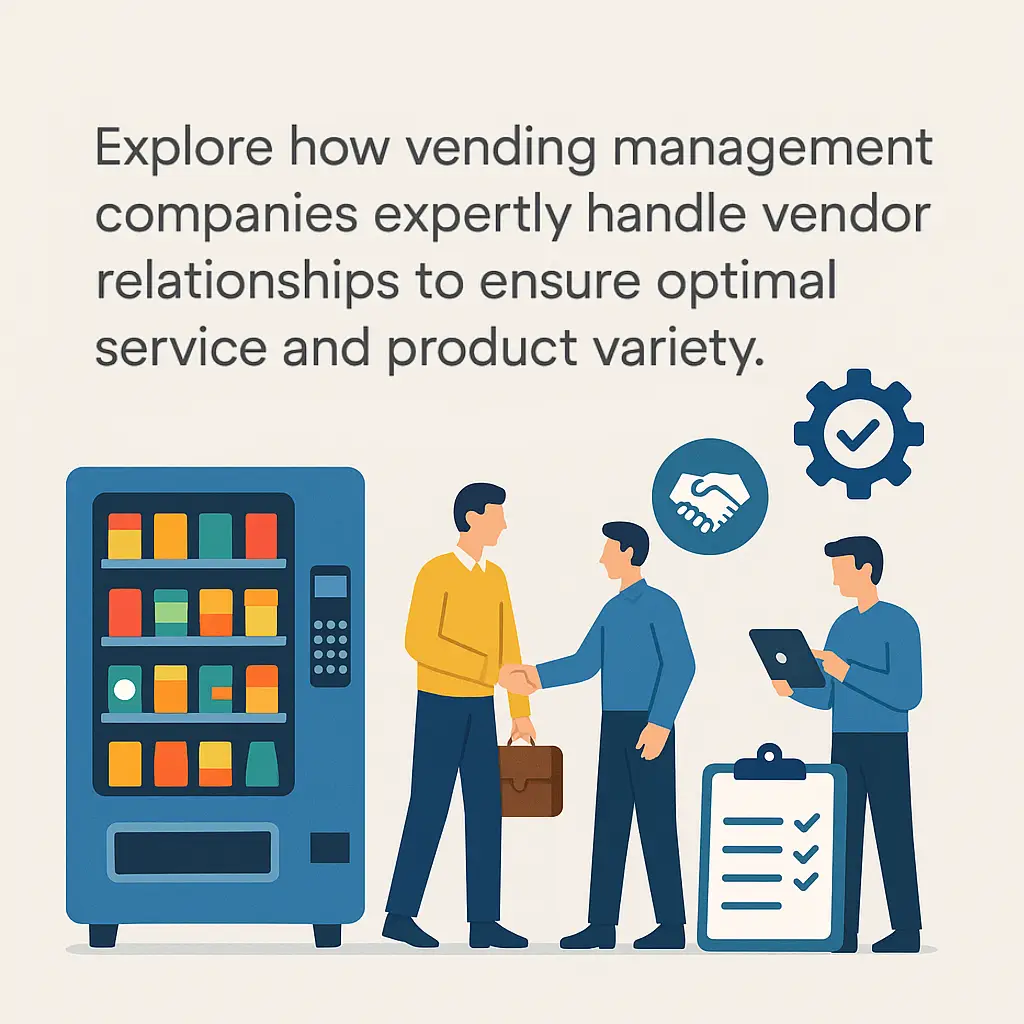Vendor Selection: Key Criteria
Evaluate vending service providers with key criteria including reliability, technology, product variety, and customer support. Choose the best partner.
Back to Vending Info for Businesses ResourcesEvaluate vending service providers with key criteria including reliability, technology, product variety, and customer support. Choose the best partner.
Back to Vending Info for Businesses ResourcesSelecting a vending service provider goes beyond just machine placement. It requires a thoughtful evaluation of key criteria to ensure a seamless and beneficial partnership for your business.
![]() Prioritize vendors with a strong track record of reliability and prompt service.
Prioritize vendors with a strong track record of reliability and prompt service.
![]() Assess technological advancements like cashless payments and remote monitoring.
Assess technological advancements like cashless payments and remote monitoring.
![]() Ensure product variety aligns with your audience's preferences and dietary needs.
Ensure product variety aligns with your audience's preferences and dietary needs.

The success of your vending program hinges significantly on the quality of your vending service provider. A strategic approach to vendor selection ensures you partner with a company that not only supplies machines but also delivers consistent service, modern technology, and a product mix that satisfies your employees or customers.
At the core of any successful vending partnership is reliability. You need a vendor who can consistently restock machines, respond quickly to service issues, and maintain equipment in top condition. Beyond the initial setup, consider their customer support structure. How quickly do they address concerns? What channels are available for communication? A responsive and proactive vendor minimizes downtime and maximizes satisfaction. This aspect is crucial for a smooth operation, much like understanding how quickly service calls are handled.
Modern vending machines are sophisticated pieces of technology. Look for providers who offer cutting-edge features such as cashless payment systems, remote monitoring for proactive restocking and maintenance, and energy-efficient models. Furthermore, the product variety must cater to the diverse preferences of your audience. Whether it's healthy snacks, gourmet coffee, or specific branded items, a flexible vendor can customize their offerings to your needs, thereby improving overall user experience. This also ties into important agreements, such as knowing commissions in vending contracts.
Before finalizing your decision, carefully review the vending contract terms. Key elements include the contract duration, termination clauses, maintenance schedules, and potential revenue-sharing models. A good contract provides clarity and protects both parties. Additionally, evaluate the vendor's willingness and ability to offer customized solutions. Can they brand the machines with your company logo? Are they open to adjusting product selections based on feedback? These customizable aspects can significantly enhance the vending experience and reinforce your brand image. Understanding these details is as important as learning how vending contracts work.
Key criteria include reliability, technology capabilities, product variety, customer support responsiveness, and contract terms.
Reliability is crucial. An unreliable vendor can lead to empty machines, unfulfilled service requests, and frustrated employees or customers.
Look for cashless payment options, remote monitoring, inventory management systems, and energy-efficient machines.
A diverse product offering ensures that a wider range of preferences and dietary needs are met, increasing overall satisfaction and usage.
Review their response times for service calls, their communication channels, and available testimonials or references.
Yes, a vendor with experience in your specific industry will better understand your unique needs, regulations, and preferred product mixes.
Favorable contract terms regarding duration, termination clauses, maintenance, and revenue sharing are essential for a successful partnership.
Customization ensures the vending service aligns perfectly with your business branding, employee preferences, and specific location requirements.
Evaluate the pricing model (e.g., commission-based, fixed fee) to ensure it offers good value and transparency, contributing to a mutually beneficial arrangement.
Beware of providers with poor communication, lack of transparency in pricing, negative reviews, or unwillingness to customize services.